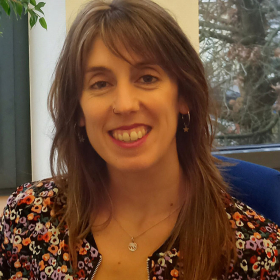

Leire, European Commission
« J’ai toujours adoré les langues et la communication. C’est pour cela que je n’ai pas hésité à m’inscrire au concours de traduction pour les institutions européennes. Mes études en Communication Audiovisuelle et Traduction m’ont effectivement donné l’expertise suffisante pour le réussir.
Travailler au sein de la DG Traduction de la Commission, c’est l’idéal pour moi ! J’adore le travail artisanal que représente la traduction : les recherches terminologiques, l’apprentissage quotidien de nouveaux sujets, le travail d’équipe... Je suis fière de rapprocher les citoyens de la législation de l’UE en contribuant à la qualité des textes qu’ils peuvent consulter, en aidant les experts à mieux exprimer leurs idées clés... La traduction, c’est un défi continu, une interrogation permanente : “Comment puis-je mieux exprimer cette nuance-là... ?”.
Au-delà de ma passion pour ce métier, Luxembourg s’est avérée être une ville fascinante et accueillante où la vie est rythmée par de nombreux évènements. Mon équipe de collègues y est d’ailleurs devenue ma deuxième famille. La preuve évidente de tout cela est que le dimanche soir n’est plus un moment morne, mais la veille d’une nouvelle semaine remplie d’expériences inédites ! »
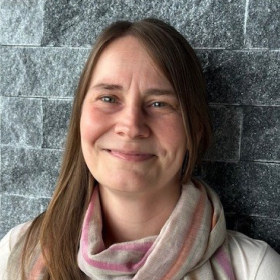
Malene, European Commission
“I love working with my languages in a place where it really matters and at a very high and professional level. I’m proud of contributing to facilitating EU lawmaking, translating legislation into Danish. It’s very inspiring to work in a team of like-minded colleagues who are also very passionate for languages. That common passion brings us the most interesting linguistic discussions, which I really enjoy and I think can be found nowhere else.
The international environment gives me freedom to live and enjoy my life in the way I choose. I love to travel, and the flexibility of my job allows me to see many new places. Kom ned og bliv en del af vores team! (EN: Come and join our team!)”
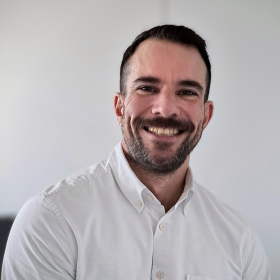
Ivan, Council of the EU
“I’ve been working as a lawyer-linguist at the Council of the EU for three years. In this role, we revise all EU legal acts that are to be adopted by the Council of the EU and the European Council, ensuring legal and linguistic consistency across all language versions. This allows me to combine my legal expertise with my passion for languages. I’m proud to contribute to the EU legislative process and to collaborate with fellow lawyers and assistants from nearly every Member State. There is a strong sense of community among us, and the atmosphere is always welcoming and supportive.”
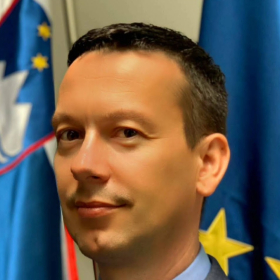
Matija, Council of the EU
“At the Legal Service of the General Secretariat of the Council, I have the opportunity to collaborate closely with colleagues from all EU Member States, working in all EU languages, and contributing to the quality of EU legislation.
As a lawyer-linguist, I especially enjoy working as a quality advisor and ʻchef de fileʼ, overseeing a team of lawyers and other administrators within the Council and from other institutions to legally and linguistically finalise the base language (English) version of legislative files. In these roles, strong coordination and leadership qualities are essential to completing all tasks within tight deadlines.”
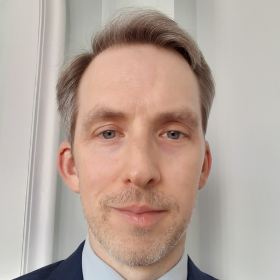
Nelius, European Commission
“Working for the Quality of Legislation (LEG) team at the Legal Service is to be part of a highly professional and inspiring team.
We constantly seek and find the best way to apply drafting rules to exciting aspects of Union life such as the Covid crisis, rules on chemicals, the environment, health and safety protection, and finance. There is a strong reliance on team discussions to achieve the best approach for new situations – and discussions are invariably collegial and fruitful: no colleague is alone, we find solutions together.
On a daily basis, I feel that my colleagues and I are playing a meaningful, useful and vital role in Union law, and in participating in the project of an ever-closer Union, for citizens and businesses, in all 24 languages.”

Barry, European Parliament
Working as a lawyer-linguist at the Directorate of Legislative Acts in the European Parliament allows me to use my languages and legal expertise to play a vital role in the democratic process of the Union.
One of the most rewarding aspects of my job is advising Members of the European Parliament on legal drafting, helping to shape the legislation that affects millions of Union citizens. I really feel that I am at the heart of European law making!
The collaborative, multilingual environment makes every day intellectually stimulating, and I take great pride in ensuring that Union law is accessible to all.
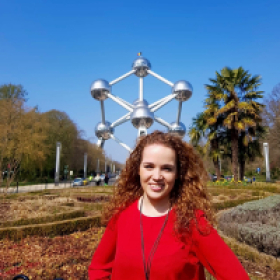
Tessa Pouels González, lawyer-linguist assistant in the Dutch team in the Directorate Quality of Legislation
My name is Tessa, I come from Spain and I work as a lawyer-linguist assistant in the Dutch team.
When I finished my master's degree in legal translation, I thought that my next step would be to work as a freelancer, but I am proud to say that the European institutions offer opportunities to motivated young people eager to be part of the European project.
Working at DQL – where we check the drafting quality of legal acts of the European Council and of the Council – is both challenging and rewarding, as you get to participate and gain an insight into the process of adopting legislation. It is most motivating to be part of a multicultural team with colleagues from different academic, professional and social backgrounds where you are constantly encouraged to continue growing personally and professionally, while benefiting from good working conditions, a wide range of training opportunities and the possibility to change jobs between services and institutions.
If you always wanted an international challenging and interesting career, I highly recommend working for the European institutions. Besides, life in Brussels is enriching and interesting with many activities and events to enjoy.
Lawyer-linguist assistant in the Dutch team in the Directorate Quality of Legislation (DQL) at the Council of the European Union
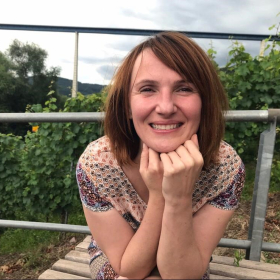
Agnieszka Wendel, asistent lingvistic în cadrul Unității poloneze de traducere
Lucrez de 15 ani la departamentul de limbă polonă al Direcției Generale Traduceri (DGT) din Luxemburg.
Am studiat filologia spaniolă și studiile americane la Universitatea Jagielloniană, în Polonia. Înainte de a lucra la DGT, am fost funcționar la Consulatul american din Cracovia. Îmi doream să-mi continui parcursul profesional într-un mediu internațional.
Îmi place ce fac deoarece:
- mă simt parte din societatea europeană,
- nu mă plictisesc nicodată,
- mă ajută să mă dezvolt din punct de vedere profesional.
Munca în cadrul DGT îmi aduce multe satisfacții. Simt că ceea ce facem contează cu adevărat în lume. Textele cu care lucrăm se referă la probleme reale, uneori mondiale. Fiind conștientă de aceste probleme, înțeleg ce înseamnă UE pentru noi toți. Postul de asistent lingvistic îmi oferă multe oportunități, deoarece evoluează în pas cu lumea. Când am început acum 15 ani, munca pe acest post era total diferită. Totul s-a dezvoltat: competențe, software etc. Am avut șansa de a face cursuri datorită cărora am dobândit noi aptitudini informatice și am învățat limbile germană și franceză. Mi-am putut dezvolta competențele sociale. Mai mult, am avut șansa să lucrez câteva luni la Parlamentul European – una dintre cele mai interesante experiențe.
Pentru mine, cea mai mare provocare este echilibrul dintre viața profesională și cea privată. Am doi copii mici pe care îi cresc singură. Prin urmare. apreciez mult că DGT îmi permite să-mi organizez timpul de lucru (de exemplu, să lucrez cu fracțiune de normă).
Am venit în Luxemburg în 2007. Mi s-a părut o schimbare majoră, pentru că veneam dintr-un oraș mare, de aproape 1 milion de locuitori. Luxemburgul, o capitală mică, m-a întâmpinat cu ploaie, dar cu un trafic relaxat și cu un mediu internațional uimitor. M-a impresionat eficiența transportului public, care îmi oferă mai multe opțiuni de a ajunge la muncă fără probleme – și de obicei la timp. Viața la Luxemburg deschide mintea. Auzi pe străzi atâtea limbi, te poți împrieteni cu oameni din toate țările Europei... chiar te simți parte a unui întreg.
Asistent lingvistic la Unitatea poloneză de traducere din cadrul Comisiei Europene (Direcția Generală Traduceri)

Sibila, European Parliament
“I have been working as a lawyer-linguist in the Bulgarian section of the Directorate for Legislative Acts at the European Parliament for almost 10 years. This is my first job within the European institutions, and I continue to value the diverse range of tasks I am involved in.
The core of my work is to revise EU legislative acts that are to be adopted by the Parliament and the Council, ensuring both their legal and linguistic accuracy. My role is to guarantee the highest possible quality of legislative texts while making EU law accessible and understandable across all Member States. This job allows me to work in both English and my native language, which I greatly appreciate. In addition, as a lawyer-linguist, I can contribute to the clarity and precision of EU legislation by advising Members of the European Parliament on legal drafting. Being part of the European Union law making process is highly rewarding and fulfilling.
The variety of tasks and the collaborative environment make the lawyer-linguist job dynamic, interactive, and satisfying. Moreover, my colleagues are multicultural, pleasant and supportive.”
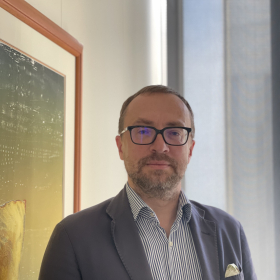
Marko (Lawyer linguist – Court of Justice of the EU)
My name is Marko, and as a lawyer-linguist at the Court of Justice of the European Union, my task is to ensure that court documents in foreign languages are translated into Estonian in such a way that the reader believes they were originally drafted in Estonian.
In my daily work, I not only need to be proficient in foreign languages, but, in addition to a solid knowledge of EU law, I must also be familiar with the legal systems of other EU Member States, sometimes creating new legal concepts in Estonian when necessary. As a quality advisor at the Estonian Translation Department, I believe that, alongside ensuring access to the widest possible body of case law in Estonian, it is crucial that our translations are as accurate as possible. This allows us to convey the true meaning of legal texts to Estonian readers.
Having worked at the Court of Justice of the European Union for over 20 years, I can confirm that the legal issues I translate are both highly engaging and topical, offering an opportunity to contribute personally to the development of the Estonian legal language. The rapid development of technology and artificial intelligence also presents daily challenges in my work – I have the extraordinary privilege of being at the heart of it all in Europe.
*****
Euroopa Liidu Kohtu jurist-lingvistina on minu ülesanne tagada, et võõrkeelsed kohtudokumendid oleksid tõlgitud eesti keelde nii, et lugejale jääks mulje, et need ongi algselt koostatud eesti keeles.
Minu igapäevane töö eeldab laialdast võõrkeelte oskust, liidu õiguse tundmist ning võrdleva õiguse analüüsi, mis hõlmab kõikide liikmesriikide õigussüsteemide mõistmist, selleks et kasutada tõlkimisel võimalikult täpset eesti õigusterminit või vajaduse korral luua uus termin. Eesti tõlkeosakonna kvaliteedinõunikuna seisan hea selle eest, et eesti keeles kättesaadava kohtupraktika tõlked oleksid võimalikult kvaliteetsed ja usaldusväärsed. Nii saab Eesti lugejale eesti keeles edasi anda õigustekstide tegeliku mõtte.
Olles Euroopa Liidu Kohtus töötanud üle 20 aasta, kinnitan, et tõlgitavad õigusprobleemid on äärmiselt põnevad ja aktuaalsed ning pakuvad võimaluse isiklikult panustada eesti õiguskeele arengusse. Tehnoloogia ja tehisintellekti kiire areng seab iga päev väljakutseid ka minu töös – mul on erakordne privileeg olla otse Euroopa südames.

